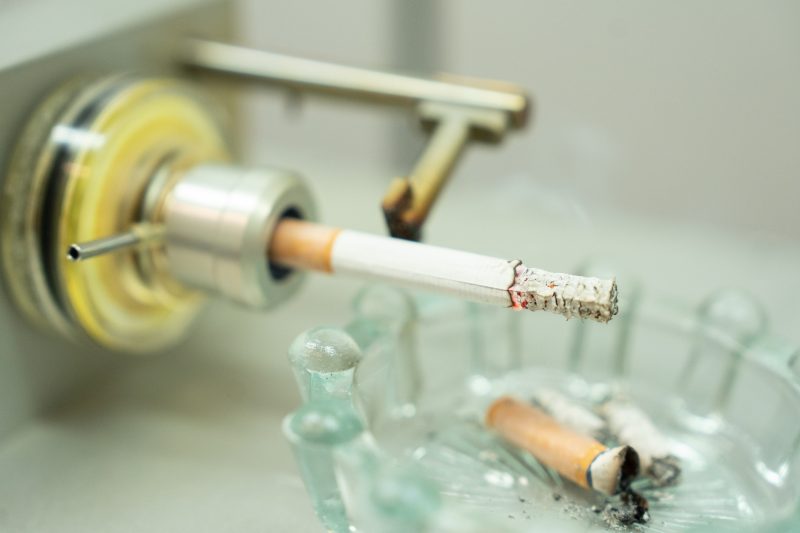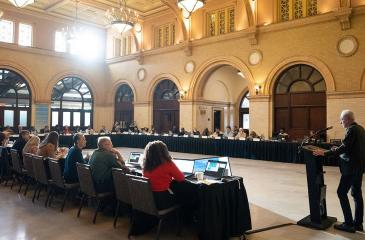Institute for Global Cancer Prevention Research hosts World Health Organization event to strengthen global tobacco control efforts
This story was written by Virgil McDill and originally published by the UMN School of Public Health.
Over 50 people from 21 countries traveled to Minneapolis for the 2023 Plenary Meeting of the World Health Organization’s Tobacco Laboratory Network (TobLabNet). Established by the World Health Organization (WHO) Tobacco Free Initiative in 2005, TobLabNet is a global network of independent laboratories that develop and validate methods and standard operating procedures for testing the contents and emissions of nicotine and tobacco products.
Hosted for the first time by the University of Minnesota’s Institute for Global Cancer Prevention Research (IGCPR), the five-day gathering brought together professionals from a variety of fields, including medical practitioners, public health officials, tobacco-control specialists, and WHO regional representatives. The event was separated into two parts: three days of plenary sessions in downtown Minneapolis, followed by two days of training workshops for some of the attendees in the Masonic Cancer Center’s laboratories on the UMN campus.
Irina Stepanov, professor at the UMN School of Public Health (SPH) and IGCPR’s director, said that hosting the event and developing the training workshops was a perfect fit given IGCPR’s dual mission of conducting cutting-edge, translational research in cancer prevention and control, and serving as a training ground for aspiring researchers from around the globe. With the support of the Masonic Cancer Center, SPH, and Medical School, IGCPR recently established a new laboratory that uses the latest techniques and develops novel methods to monitor the levels of harmful chemicals in traditional and emerging tobacco products and other sources of carcinogenic exposures, as well as identify biomarkers that signal exposure to environmental toxicants and carcinogens. They also investigate how carcinogens metabolize and damage DNA to gauge a person’s cancer risk.
“We were so honored to be chosen by the WHO to host the 2023 meeting of the Tobacco Laboratory Network, and were thrilled to collaborate with the WHO in developing the training sessions ,” says Tonya Gannelli, IGCPR’s Operations Director. “The work that we’re doing at IGCPR to train a global community of researchers on the methods and techniques to support tobacco control measures in their countries aligns perfectly with the mission of TobLabNet.”
On the fourth day of the gathering, attendees filtered into a seminar room at the University of Minnesota for the training workshop portion of the event, sipping coffee and chatting amiably in several different languages—reflecting the international scope of the gathering.
The workshops ran three concurrent, rotating sessions so that all participants could be exposed to various topics and techniques. As one of the the training sessions got underway, attendees learned about some groundbreaking work on tobacco carcinogens and biomarkers that has been conducted at the University of Minnesota. “By testing cigarettes and measuring biomarkers in the lab,” Stepanov said in a presentation, “we were able to link higher levels of carcinogens in products to higher levels of exposure in users, and ultimately to significantly higher risk of developing lung cancer. This is a perfect example of translational research that can inform public health policies,” she said.
Moving to IGCPR’s laboratory, other groups of attendees donned lab coats and were given hands-on demonstrations of various tools and their research capabilities by IGCPR scientists and researchers, including a device that literally smoked a cigarette to simulate its effect on a person who smokes, a vaping machine that calculated levels of nicotine and other chemicals in a variety of tobacco products, and an area devoted to analyzing smokeless tobacco and nicotine pouches. The attendees also had an opportunity to see the world-class mass spectrometry facility in the Masonic Cancer Center and see how this technology is used to analyze biomarkers in human DNA.

“Many of the workshop attendees work in different areas of public health, so the opportunity we provided was to actually show them the procedures and provide them the opportunity to experience how this kind of research is done,” Stepanov explained. “I heard from several people who said the experience really opened their eyes to the fact that they too can do this type of research and gave them ideas to start generating data needed to potentially support tobacco control measures in their home countries.”
“For all of us at IGCPR, that was very exciting,” said Aleksandra Alcheva, a recent SPH PhD graduate and now a postdoctoral associate at IGCPR who has been instrumental in designing and coordinating the workshop. “Giving people the ability to enhance their research skills and support them in advancing cancer prevention in their home countries is a key goal of IGCPR—and from survey information and what we heard anecdotally, the training sessions advanced those goals,” Alcheva said.
The conference was also an opportunity for IGCPR to engage in broader discussions about future collaborations of the University of Minnesota research community with the WHO in the area of tobacco control. There is a long history of research excellence related to tobacco, cancer prevention, and related public health policy and communication across various UMN centers and divisions. “We are looking forward to having our UMN research community share their expertise with the WHO and help to advance its mission of protecting and improving human health globally,” said Stepanov.
Beyond the plenaries, the seminars, and the workshops, event organizers made sure to build in time for attendees to spend time together and get to know their host city. And after preparing for brutally cold weather, attendees were pleasantly surprised by the unseasonably warm Minnesota winter, which allowed people to explore downtown Minneapolis and the UMN campus. A dinner at the University Campus Club, which featured a team-building exercise in which a guest led the group in a “laughter therapy” exercise, was a highlight. “I don’t think a lot of people were familiar with laughter therapy,” Gannelli recalled wryly, “and I heard a couple of people comment that it was definitely a U.S. thing, not something people would find back home. But it was a fantastic experience.”
Several current School of Public Health students and recent graduates also participated in the event. In addition to helping organize the training workshop, Alcheva presented some of her recent research at the opening plenary. Current SPH students Eleanore Hansen and Itorobong Uwatt (both Research Assistants with IGCPR) helped organize the logistics of the event.
